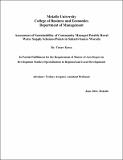| dc.description.abstract | The concern in the provision of water to rural areas in Ethiopia is lack of sustainability due to
an emphasis on construction with inadequate post-construction support and various other
related factors. The main objective of this study was thus to assess and determine the
sustainability of community managed rural potable water supply systems in Seharti-Samre
woreda by examining the main factors and identifying the limitation and key challenges. A total
of 12 Functional and 4 Non-functional water points were identified from four Tabias in Seharti-
Samre woreda, as unit of analysis for this research. A sampling procedure with both probability
and non-probability sampling method was used to identify the 4 Tabias and 16 water points, and
the survey was carried out with 112 HH. Cross-sectional design with descriptive analysis was
applied using different data collection methods. Findings of the study demonstrated that
although water management Committees were initially established, Five of the committees were
no longer fulfilling their roles and responsibilities and the majority of the rest were not also
effective. As a result majority of the studied Water Committees were frequently not collecting
and managing sufficient funds for maintenance and operation costs. From the finding of the
study the bottle necks in village level maintenance practices asides to lack of skill and poor fund
raising were lack of spare parts and a set of toolkits. The institutional support after construction
was also found very weak mainly due to limited capacity of the woreda office. The survey result
also showed that due to semi arid nature of the woreda, poor construction designs, and lack of
soil and water conservation activities almost half of the studied water points experienced
seasonal fluctuation of water sources. Based on the study finding the majority of user households
from the non-functional & partially functional water points were not satisfied with management
of the water service by water Committees. Moreover, results of the sustainability score showed
that none of studied water points are likely to be sustainable in the long term, and 62.5% are
possibly sustainable, and the rest 37.5% of the water points are unlikely that the community will
be able to overcome any significant challenge. Generally, the ineffectiveness and inability of the
water committee to ensure regular payment for O&M of facilities, lack of spare part chain and a
set of toolkits, seasonal fluctuation of many water sources, and limited external support were
identified in this study as major challenges adversely affecting the sustainability of facilities. | en_GB |


